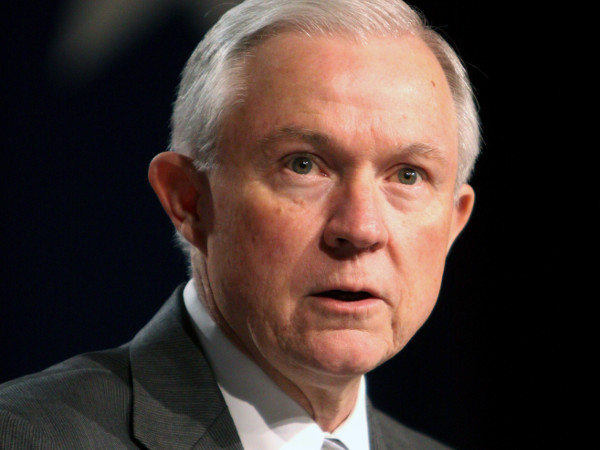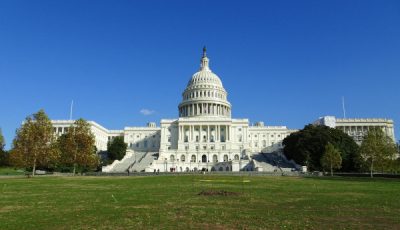Sessions Will ‘Consider’ Obscenity Enforcement
 WASHINGTON – In the middle of a confirmation hearing at which the headline-making questions and answers were mostly about immigration, race and abortion, Republican Sen. Orrin Hatch of Utah raised the specter of pornography: Would Attorney General nominee Jeff Sessions “vigorously” enforce federal obscenity laws?
WASHINGTON – In the middle of a confirmation hearing at which the headline-making questions and answers were mostly about immigration, race and abortion, Republican Sen. Orrin Hatch of Utah raised the specter of pornography: Would Attorney General nominee Jeff Sessions “vigorously” enforce federal obscenity laws?
Frankly, to characterize Sessions’ response as anything but equivocation would be entirely too generous to the prospective U.S. Attorney General.
“Those laws are clear and being prosecuted today and should be continued to be effectively and vigorously prosecuted in the cases that are appropriate,” Sessions said, showing off cautious rhetorical chops he has acquired in his dual career in law and politics.
This seems an answer designed to achieve the balancing act of placating people like Hatch while not setting off free-speech alarms among card-carrying ACLU members. In other words, it’s pure pablum, and it’s just the sort of thing to which past responses to similar questions, given in similar contexts, should have conditioned us by now.
When then-nominee to the Supreme Court Samuel Alito was asked about online pornography and what can be done to stem the tide of such by Sen. Mike DeWine [R-Ohio], for example, he offered a factually correct but otherwise un-revealing answer of his own.
In response to DeWine, Alito started by acknowledging “the problem of protecting children from pornography on the internet” was “a really difficult problem” and one with which both the legislative and judicial branches had been “struggling” ever since the internet came into common usage by consumers. Alito then correctly stated the legal dilemma surrounding porn and regulation thereof … revealing absolutely nothing of his own perspective on the subject in the process.
“The law, of course — as you know — constitutional law draws a distinction between obscenity, which has no First Amendment protection but is subject to a very strict definition, and pornography, which is not obscenity but is sexually related materials,” Alito said. “With respect to minors, the Supreme Court has said that it’s permissible for a state to regulate the sale of pornography to minors… I think that’s the Ginsburg case. It has greater authority there than it does with respect to the distribution of pornography to adults.”
That’s all true enough, Sam, but what does it have to do with where you stand on porn, obscenity prosecutions and the relative priority thereof? The response said nothing probative with respect to those questions — and that was no accident.
From the perspective of the person who nominates a candidate for a post, the first (and in the short term, most important by far) job a political nominee must undertake in the process of Senate confirmation is to get confirmed, not to respond to the Senate’s questions in detail, or even to answer them honestly.
Sessions’ confirmation hearing has revealed absolutely nothing about his intention (or lack thereof) to make obscenity prosecutions a higher priority for the Trump administration’s Department of Justice than they were under the Obama administration.
The one specific measure about which Sessions was asked: the idea of reinstating the Obscenity Prosecution Task Force, a task force Sessions said he wasn’t even aware had been disbanded under President Obama.
Sessions’ response? If you guessed he was noncommittal and vague, give yourself two points.
“That unit has been disbanded,” Sessions said, seeming to imply a question mark not present in the hearing’s transcript. “I’m not sure I knew that, but it was a part of the Department of Justice for a long time and I would consider [reestablishing it].”
So, Sessions is “not sure” he knew the group had been disbanded, but now that he does know, he’ll “consider” reviving it. All clear on what may or may not happen, or what is or may not have been known to Sessions prior to the hearing? Of course you aren’t, because you can’t and aren’t supposed to be, based on the plain text of Sessions’ non-answer, at least.
Another response Sessions offered on a completely different subject only further underlines how little stock we should put in anything the man said during the hearing.
In a remarkable exchange with Sen. Patrick Leahy [D-Vermont], Sessions was asked about one of his past comments about marijuana users. Note how Sessions didn’t exactly deny uttering the words to which Leahy referred, instead finessing his response and framing it as another of those things he’s not sure he knows:
Leahy: In the past you have called for the death penalty for second-time marijuana offenders.
Sessions: That doesn’t sound like something I’d normally say.
Leahy: Would you say that’s not your view today?
Sessions: That is not my view today.
While I suppose it’s good news to hear Sessions no longer thinks people who smoke marijuana should be put to death if they get caught more than once, my relief is given pause by the specific words he chose in distancing himself from that position. It doesn’t sound like something he’d “normally say”? What on earth does that mean?
Does it mean Sessions was trying to avoid saying anything that would contradict his words during a Senate hearing last April, when he asserted “good people don’t smoke marijuana”?
“We need grownups in Washington to say marijuana is not the kind of thing that ought to be legalized, it ought not to be minimized, that it is in fact a very real danger,” Sessions added at the time.
We need such “grownups” in Washington, but not necessarily in the AG’s office, evidently. The same guy who not long ago said second-time marijuana offenders should be put to death now says when it comes to deciding when, where and how to prosecute under federal law citizens who haven’t violated the law of states that have legalized marijuana (whether for medicinal or recreational use), “Using judgment in how to handle these cases will be mine, and I will do it in a fair and just way.”
So, just to recap, a man who wouldn’t “normally say” marijuana users should be put to death (but has said such, whether he said it normally or not) now says he’ll be “just and fair” when applying the law toward such users in the future. And the same guy says he’ll “consider” reestablishing the Obscenity Prosecution Task Force.
It’s also worth noting that on the second day of his hearing, when Sessions was asked whether grabbing a woman by the genitals without her consent constitutes sexual assault, he said “Clearly, it would be.” It’s a solid and firm response, but also one that doesn’t exactly mesh with Sessions’ previously stated views on the same question.
So, in light of all the evidence presented, do I believe Sessions will be fair, just, evenhanded and reasonable with respect to areas of law in which his past comments suggest he’s anything but fair, just, evenhanded and reasonable?
I’ll consider it.













